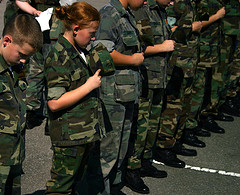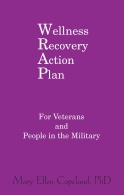 WRAP is an excellent recovery tool for Veterans and found especially effective when presented to by a trained peer facilitator.
WRAP is an excellent recovery tool for Veterans and found especially effective when presented to by a trained peer facilitator.
By: Eric J. Fournier, Vice President, VT Vet To Vet (September 2015)
Veterans find WRAP to be an effective tool in their recovery. Vermont Vet To Vet has incorporated WRAP into their recovery groups with great resources such as WRAP for Veterans and People in the Military. Each group has a different focus and uses WRAP in very unique ways to help Veterans cope with their personal recovery. Facilitators who are trained in WRAP teach their fellow Veterans how to make their personal WRAP plans. Usually facilitators only have one or two groups worth of time to teach Veterans how to use WRAP so the lessons are streamlined, but effective. Often facilitators will report being approached by Veterans after they have graduated from their programs and the Veterans will tell the facilitator how much their WRAP plan has helped them in their recovery.
The reason that WRAP is highly effective among Veterans is because of it’s structure. Often when a Veteran is released from the military they lack structure in their lives and WRAP helps them refocus and build structure back into their lives. Another reason WRAP is an effective tool among the Veteran population is because many Veterans are selfless. Being selfless is something that is instilled into Veterans as part of their lifestyle. For instance the Navy motto is Honor, Courage, & Commitment; they are required to think of the good of the unit before themselves, honoring the Navy, being courageous for their fellow shipmates, and being committed to the mission. WRAP helps Veterans allow themselves to focus on their own self – sometimes for the first time in years. Questions like what do you need, who do you need to help you, and what will help you feel better are not normal day to day things that many Veterans think of. Often it’s the opposite, what can Veterans do to help their families, what can Veterans do to help their company succeed, putting others first.
Culture is very important to understand when discussing WRAP because the needs of a civilian who has never served will be entirely different than the needs of a Veteran or current Military member. It’s not that those who are in the Military are more special then civilians, its just that the needs and the language used should be different. When Vet To Vet runs their groups they avoid language that refers to war stories or questions referring to violence. The facilitators are also familiar with the terminology of the different branches of service. As referenced before it takes time to coax a Veteran into speaking about their personal needs. Many Veterans only trust talking about their needs and problems to other Veterans and will seek their peer’s help before talking to a professional. It’s one of the reasons for the success of Vermont Vet To Vet for the last 9 years and why Vet To Vet has worked with and strongly recommends WRAP in their programs.
Recently, Vermont Vet To Vet held a Basic WRAP course at the White River Junction, VA Hospital taught by Jane Winterling & Nate Lulak. There were 10 graduates from the program; all Veterans. Everyone had a great experience and learned a lot about themselves. Because of this training opportunity for these Veterans a few now have a strong interest in following through with becoming WRAP Facilitators to help train other Veterans and continue the strong tradition of WRAP among the Veteran community. People like Jane and Nate, and programs like Vet To Vet are why WRAP has such a strong hold in the Veteran population.
VT Vet to Vet meets at the Residential Recovery Center (RRC) – VA Hospital, Ground East Mental Health Wing – VA Hospital, Springfield Correctional Facility, and at the Burlington VA Clinic.
Check out some of our great WRAP resources that
Veterans and People in the Military find most helpful:




Mary Ellen Copeland, PhD, developed Wellness Recovery Action Plan (WRAP) with a group of people with lived experience who were attending a mental health recovery workshop in 1997. She is the original author of the WRAP Red Book, as well as dozens of other WRAP books and materials. She has dedicated the last 30 years of her life to learning from people who have mental health issues; discovering the simple, safe, non-invasive ways they get well, stay well, and move forward in their lives; and then sharing what she has learned with others through keynote addresses, trainings, and the development of books, curriculums, and other resources. Now that she is retired, and that, as she intended, others are continuing to share what she has learned, she continues to learn from those who have mental health issues and those who support them. She is a frequent contributor to this site.





